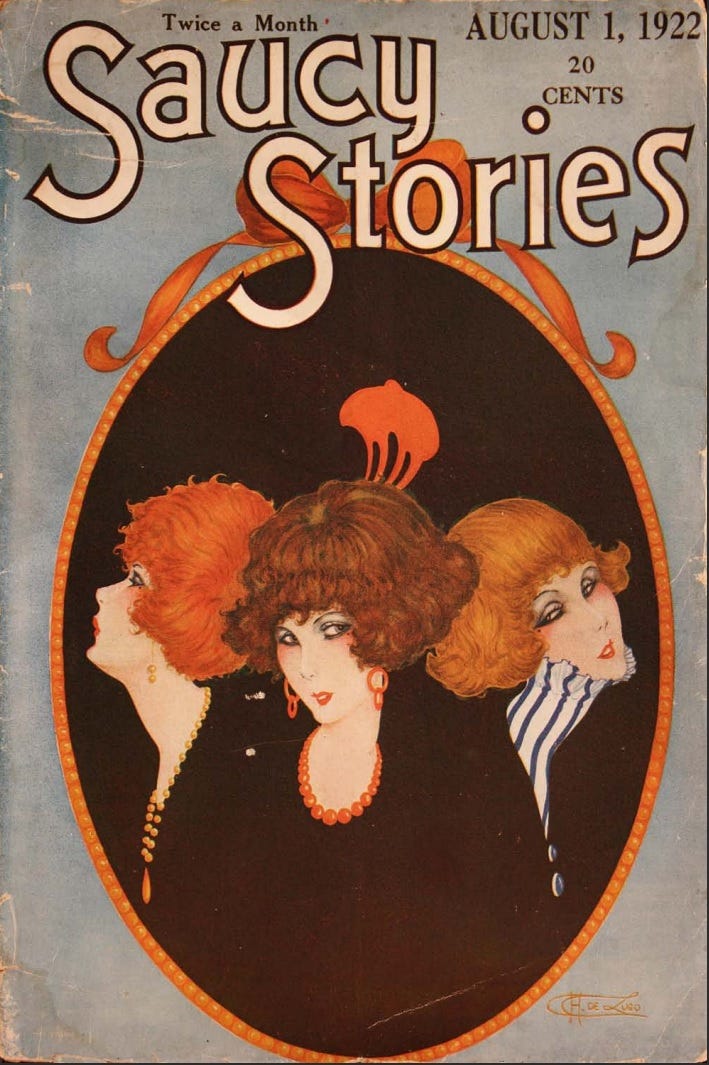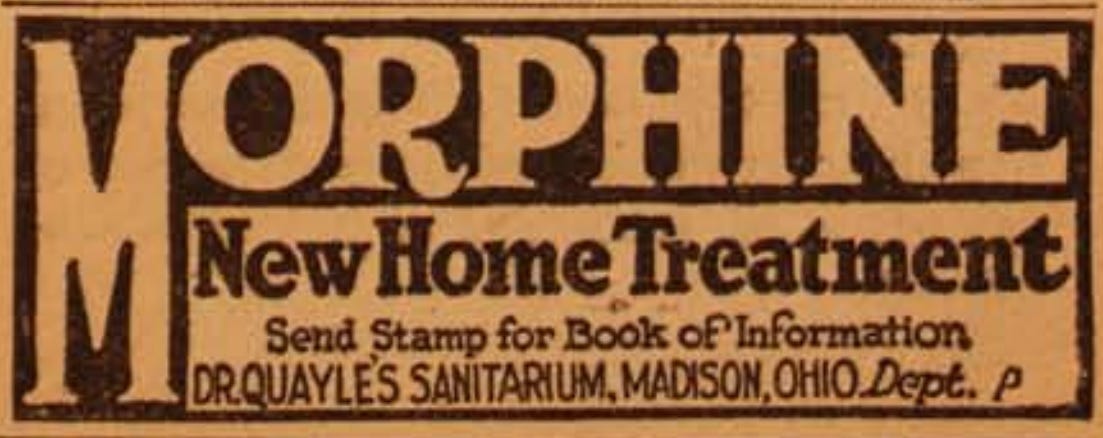Dead Wood: Between the Pages of 'Saucy Stories', August 1922.
The Pulpiest summer stories of 1922, featuring Gangsters and Flappers, Showgirls and Hollywood Gossip...
The August 1st, 1922 edition of “Saucy Stories” was delightful enough to re-print in full. There are enough flappers and detectives, playboys and second-story men, to excite any ‘Pulp’ fan. To keep our word limit reasonable, I was forced to limit myself to a number of excerpts, with clips from the advertisements and promotional items sprinkled in between. At the end, you’ll find a link to read the full magazine…
The Flapper Fools Them
by Philip Somers
To those who sat nearby on the roof of the Hotel Belleford, the girl in the mouse-gray frock seemed a smart little flapper. Her suede pumps barely touched the tile floor, and the expanse of silken sheerness beneath the table revealed legs that were slim and shapely. Her saucy head was ringed with bobbed brown hair and her eyebrows were finely penciled.
The man opposite was a totally different type. His complexion was as swarthy as the girl’s was pale, and his hands were as heavy and pudgy as hers were delicate. Each puffed at a cigarette in a long holder, and they both had sampled the contents of a silver pocket-flask.
The girl was idly blowing smoke from her red lips and listening to what her companion was saying in a low, guarded tone.
“Of course, I hadn’t figured on finding you here,” he said, “but it’s certainly good to see you. The going must have been good—to judge from the class of your costume—and the fact that you’ve rooms in a house like this.”
She smiled and shrugged her slim shoulders.
“The going was good,” she confessed, “before Bill was blown up by a bomb while trying to lift that necklace from the yegg who stole it.”
Her expression hardened and a cruel look came into her deep brown eyes. She had never forgotten the pang of Bill’s death. And despite the lenient sentence she had been given because she had informed on the fellow crook who contrived to kill him, Madge the House was still an outlaw at heart…
The Call for Help
by Crosby George
He did not look like a second-story man. His eyes were not sinister, menacing or cunning with the craft of a man perpetually alert for the police. They were blue and harmless. His clothes were not those commonly associated with the profession of removing from the dressers, jewel-safes, and necks of matrons the jeweled fruits of their husbands’ toil. He was not attired in shapeless trousers. He wore a suit of blue serge, the trousers of which bore a crease as sharp as the prow of a battleship. No nondescript cap hung rakishly over one eye. Instead, a black derby of extreme style in regard to brim and shape was fastened at the precise angle recommended in the “What the Man Will Wear” columns of theatre programs.
He did not look like a second-story man. And for a very good reason. He was no second-story man.
Yet, this balmy evening in late August, he was carefully climbing up a short ladder which was resting against the wall of a house he had never before entered.
Archie Drewe was not enjoying the exercise. Ladder-climbing was no hobby of his. His taste ran to the collecting of antiques and rare pictures. He was intensely interested in the flora of the Caribbean Islands. He loved a quiet game of chess. And yet this evening he had abandoned the very latest book on the subject of Caribbean flora and a most intriguing chess-problem to go ladder-climbing.
The answer was, of course, Romance…
A Dead Man’s Business
by Dixie Willson
Letty Pinkus was a pretty little thing. Not awfully striking, nor awfully brilliant, and not in a position really to be either, inasmuch as she was merely a waitress in her mother’s boarding-house. But Letty Pinkus was mighty sweet and pretty, there was no avoiding that.
Of course she was only eighteen, which is sweetness and prettiness in itself, but she had something entirely unforgettable about her eyes and that was what old Bill Cooper fell madly in love with.
Bill Cooper had never really had anything to love in all his life. He was a sailor—a parrot-nosed sailor, as rough as they make ‘em, and rich enough to get drunk all he pleased. He had no family at all—except one crook of a nephew—and, like every old sailor, though he had had eighty sweethearts, he’d wanted no one of them more than a week.
Then one day in May he met Letty Pinkus…
The House of the Missing
by Sinclair Gluck
Synopsis of Preceding Chapters:
The young sister of Jack Clayton has disappeared in New York. After weeks of fruitless search, a man from a Secret Bureau of Investigation calls on the brother and tells him that thirty young Society girls have disappeared in the past year, that this Bureau was organized to run down the gang responsible for the kidnapping, and asks Clayton to become one of the organization. The man, Moore, also tells Clayton that there has been a leak in the Bureau of late, as the rooms of some of the members have been ransacked. Suddenly Moore goes stealthily to a curtained window, revolver in hand. There is a loud report. A bullet has grazed Clayton’s cheek, and an unknown man staggers from behind the curtains. Moore has shot him through the heart. They find that Clayton’s wound is from a strange weapon like an air-gun, carried by the intruder. Larry, Clayton’s servant, an ex-burglar, calls a policeman known to Moore, who removes the body and promises secrecy. Clayton goes with Moore to the Headquarters of the Bureau and becomes a member. He and Moore are to work as partners, though before others they are to appear strangers. They are to pose as men of wealth and position, and try to find a clue to the kidnappers among the members of Society. For the first time in his search for his little sister Margaret, Clayton feels hopeful. But he returns to his apartment to find that his desk has been ransacked!
She Who Hesitates—
by Dorothy Thomson
Two long rows of girls, on opposite sides of mirror-topped dressing-tables. Towels covering careful curls, and fastened at the nape of the neck with safety pins. Cold-cream in gobs, grease-paint in heavy coatings. Are these hideous, messy creatures the delightful damsels who will presently slither bonelessly upon the stage, chanting:
“Will you be my Lolly Pop?
Sweet, luscious Lolly Pop?”The Dimpled Dumb-Bell
by Helen Hysell
Trip Hagar regained his balance and stared at the bald-headed man who had pushed him away from the limousine door. The man was undoubtedly old, and even his white mustache appeared feeble as it drooped dejectedly over his thin, loose lips. Yet it was he, the owner of the car, and not the athletic-looking chauffeur who had thrust Trip aside.
Hagar was not in the habit of lurking about rich men’s limousines. His business—or perhaps it might better be called a profession in this day of specialization—had to do with those same rich men when not accompanied by chauffeurs or other paid protectors.
Trip was a hold-up man of discrimination and distinction. He worked at night. This afternoon he had merely paused to roll a cigarette and was gazing absently at the blue-and-gold monogram on the door of the car when the owner came out of the Hotel Gregory and crossed the sidewalk.
There was no room for surprise or anger in Trip’s eyes as he stared through the window of the car as it moved slowly away. He wanted, if possible, to catch another glimpse of the blue-green stone that adorned the old man’s left hand.
Trip knew a dealer in antique jewelry who would pay in the neighborhood of five thousand dollars for the Minibilh, the historic turquoise that had ornamented a Shah of Persia in the year 1688.
Trip believed he had recognized this valuable jewel on the hand that had thrust him so roughly away from the limousine…
The Lost Heiress
by Roger Wade
Detective Barker prided himself upon the fact that he never forgot a face. Yet he could not place the man who sat opposite him in the smoking-car. He was certain he had seen him before and under unusual circumstances. Perhaps it would come to him. Maybe the man would betray himself by a gesture, a turn of the head, or some personal habit that Barker would recognize.
The train was puffing through the prairies of the Middle West. In about an hour they would be in St. Louis. The smoking-car was deserted save for these two…
It was part of Barker’s duty to know by sight those crooks wanted by the police. Somehow he could not help but place this chap—handsome though he was, and certainly not of a criminal cast of features—in that class. He did not look like the average jailbird, and yet—
Suddenly it came to him. He gasped. Three years ago. He remembered now. It had to do with a certain affair that was still unsolved; a riddle that had never been answered…
Saucy Shots from Studios
by Dorothy Donnell Calhoun
Everyone connected with the movie industry is busy trying to find an alibi to explain away the uncomfortable fact that in February of this year fewer people by eight million went to the movies than in the corresponding month last year.
John Griffith Wray, the director, thinks that the trouble is injudicious methods of exploitation. The public has been plied with superlatives. Every new picture is claimed to be “the most marvelous, most artistic, most costly, most sensational” picture ever made. Alliteration’s artful aid abounds in the announcements: “dazzlingly daring; distractingly devilish.” Capital letters sprinkle the advertisements as thickly as the freckles adorning Wes Barry’s map: “She was Mad for Money,” “She Yearned for the rightful Joys of Youth,” or “If You found Your Wife was holding Hands with Another Man by Radio, what would You Do?”…
Click here to read the full magazine, courtesy of the Internet Archive…
DEAD WOOD brings you regular excerpts from the years before ideas became “content”. Some editions will be serious and thought-provoking. Some will be ludicrous or silly. Some will be chosen just because they happened to strike us as particularly interesting.
If you have an excerpt of “Dead Wood” you’d like to suggest, email Juke at tonyajuke@gmail.com
We hope you’re enjoying Juke. Subscribe for free to receive new posts by email. To receive special member-only posts and benefits, please consider supporting our writers with a monthly or yearly paid subscription.














I don’t anything about 1922, but it sounds like it was… oh what’s the expression?… from a different time. Yes, that’s it.
Love this! This is a world I dearly wish I had inhabited. Of course if I had I'd've been long dead by now, so I am grateful for the fabulous pulp that lives on.